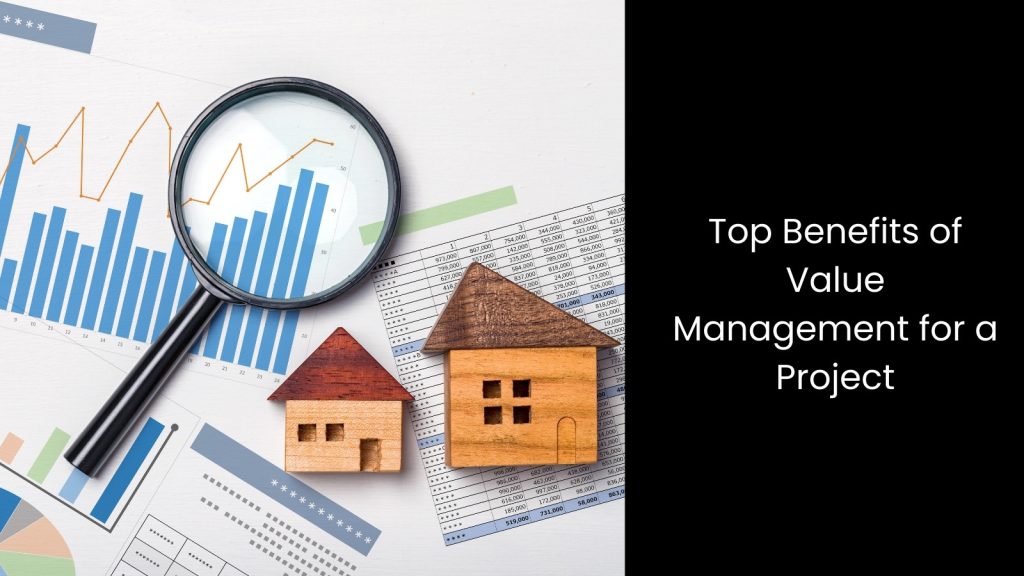Do you know that budgeting of a project is similar to the two sides of a coin? One side can bring you higher in the business world, while the other side can drag you to the bottom of the ladder. This is why businesses tend to focus more on budgeting, especially when they initiate specific projects. The Australian project management landscape is no exception in that sense. How can organisations ensure they maximise the benefits of their projects while minimising costs and risks at the same time? This pressing question leads us to the vital concept of value management, a strategic approach that holds the key to enhancing project success.
This article will help you understand the concept of value management and its importance.
This article will help you understand the concept of value management and its importance.
Understanding Value Management

- The above-mentioned concept is a systematic approach that focuses on improving the value of a project by balancing its functions, costs, and quality. The primary goal of value management is to maximise project value while minimising costs.
- Not only that, but it also encourages project managers to analyse each aspect of a project, from initial design to execution, ensuring that every element contributes positively to the overall objectives. However, this is not a simple application. Why would we say that?
- In practice, value management involves a series of workshops and meetings where stakeholders collaborate to identify essential functions of the project. During these discussions, teams assess how to deliver these functions most efficiently and effectively. They explore different alternatives and solutions that can enhance value without compromising quality or performance. This process seems to create innovation as team members think creatively about how to achieve project goals. Moreover, value management promotes a culture of continuous improvement, where teams regularly review their approaches and outcomes.
- Just by focusing on value, organisations can align projects with their strategic objectives. At the same time, they can easily ensure that every initiative supports broader goals. Value management also emphasises stakeholder engagement, ensuring that the needs and expectations of everyone involved are met. This engagement leads to higher satisfaction levels and strengthens relationships among stakeholders.
- So, it is a proven fact that in today’s competitive landscape, value management paves the way for effective project management.
Top Benefits of Value Management for a Project

Alignment with Organisational Goals
In order to witness successful project completion, it is important for the project managers to fully align with their organisational goals. How can you expect the best possible outcome if your business train runs off the rails of the track?
When the same company adopts value management approaches, it can ensure that every project decision, action, and resource allocation directly supports the overall mission and objectives of the organisation. When project teams implement value management, they begin by identifying the strategic goals of the organisation. This clear understanding helps teams evaluate how the project contributes to these goals.
As they focus on value, project teams analyse the functions that add the most benefit and identify any unnecessary costs. They engage stakeholders throughout the process, gathering input and feedback to ensure that their needs align with the organisation’s strategic direction. This collaboration establishes a sense of ownership among stakeholders, which increases their commitment to the project.
As teams work through value management, they consider various alternatives and solutions that enhance project value while still aligning with the organisation’s goals. For example, if a company aims to improve customer satisfaction, the project team focuses on delivering high-quality outcomes that meet customer expectations. This alignment ensures that the project does not just achieve its objectives but also supports broader company aspirations.
When the same company adopts value management approaches, it can ensure that every project decision, action, and resource allocation directly supports the overall mission and objectives of the organisation. When project teams implement value management, they begin by identifying the strategic goals of the organisation. This clear understanding helps teams evaluate how the project contributes to these goals.
As they focus on value, project teams analyse the functions that add the most benefit and identify any unnecessary costs. They engage stakeholders throughout the process, gathering input and feedback to ensure that their needs align with the organisation’s strategic direction. This collaboration establishes a sense of ownership among stakeholders, which increases their commitment to the project.
As teams work through value management, they consider various alternatives and solutions that enhance project value while still aligning with the organisation’s goals. For example, if a company aims to improve customer satisfaction, the project team focuses on delivering high-quality outcomes that meet customer expectations. This alignment ensures that the project does not just achieve its objectives but also supports broader company aspirations.
Informed Budgeting
Budgeting is something that you cannot do blindly. You need to be in the actual senses, which is exactly what value management does.
This concept provides a clear framework for understanding the relationship between costs, project functions, and overall value. When project teams apply value management, they focus on identifying the essential functions that deliver the most benefit to the project and the organisation. After analysing these functions, teams can determine where to allocate resources effectively, ensuring they invest in areas that generate the highest value. This process allows teams to identify unnecessary expenses and eliminate them, which helps streamline the budget.
For example, instead of blindly following previous budgets, project teams use value management to assess each item based on its contribution to project goals. They engage in discussions with stakeholders to understand their needs, which leads to more accurate cost estimates and a budget that reflects the true value of project outcomes. After incorporating stakeholder feedback, teams ensure they address all necessary aspects of the project while avoiding over- or under-budgeting.
Not to mention that value management encourages teams to explore various options and alternatives, which can lead to more cost-effective solutions.
This concept provides a clear framework for understanding the relationship between costs, project functions, and overall value. When project teams apply value management, they focus on identifying the essential functions that deliver the most benefit to the project and the organisation. After analysing these functions, teams can determine where to allocate resources effectively, ensuring they invest in areas that generate the highest value. This process allows teams to identify unnecessary expenses and eliminate them, which helps streamline the budget.
For example, instead of blindly following previous budgets, project teams use value management to assess each item based on its contribution to project goals. They engage in discussions with stakeholders to understand their needs, which leads to more accurate cost estimates and a budget that reflects the true value of project outcomes. After incorporating stakeholder feedback, teams ensure they address all necessary aspects of the project while avoiding over- or under-budgeting.
Not to mention that value management encourages teams to explore various options and alternatives, which can lead to more cost-effective solutions.
Putting Main Focus on Value Creation
The latter prioritises activities and decisions that maximise the benefits delivered to stakeholders. Let us walk you through this process.
When project teams adopt value management practices, they start with defining the core objectives of the project and understanding what stakeholders truly value. This understanding allows teams to identify critical functions that contribute significantly to the project’s success. As they can concentrate on these functions, teams can analyse how to deliver them in the most efficient way, reducing costs while maintaining or even enhancing quality.
For instance, instead of merely focusing on completing tasks or staying within budget, value management pushes teams to think creatively about how to innovate and improve project outcomes. This approach creates a culture of collaboration where team members share ideas and explore alternatives that can lead to higher value.
When project teams adopt value management practices, they start with defining the core objectives of the project and understanding what stakeholders truly value. This understanding allows teams to identify critical functions that contribute significantly to the project’s success. As they can concentrate on these functions, teams can analyse how to deliver them in the most efficient way, reducing costs while maintaining or even enhancing quality.
For instance, instead of merely focusing on completing tasks or staying within budget, value management pushes teams to think creatively about how to innovate and improve project outcomes. This approach creates a culture of collaboration where team members share ideas and explore alternatives that can lead to higher value.
Improved Project Efficiency
Value management stresses systematically analysing project functions and identifying ways to deliver them more effectively while minimising costs.
When project teams apply value management principles, they determine the essential functions that the project must achieve. This process involves engaging stakeholders to understand their needs and expectations, which helps teams focus on what truly matters.
When prioritising these essential functions, teams can eliminate unnecessary tasks or processes that do not contribute to project goals. It streamlines workflows and makes better use of resources. For instance, value management encourages teams to explore innovative solutions that might speed up processes or reduce waste. This emphasis on creativity allows teams to think outside the box and discover new methods or technologies that enhance efficiency.
Furthermore, value management promotes a collaborative environment where team members share insights and expertise. By working together, they can identify potential bottlenecks in the project and devise strategies to overcome them. This collaborative effort often leads to faster decision-making, as team members feel empowered to propose changes that improve efficiency.
Also, value management includes regular reviews and assessments throughout the project lifecycle. These evaluations allow teams to track progress, identify any inefficiencies, and make necessary adjustments in real-time. This proactive approach prevents issues from escalating and ensures that the project remains on schedule. As it is possible to focus on continuous improvement, companies can consistently refine their processes, and this will lead to enhanced productivity.
When project teams apply value management principles, they determine the essential functions that the project must achieve. This process involves engaging stakeholders to understand their needs and expectations, which helps teams focus on what truly matters.
When prioritising these essential functions, teams can eliminate unnecessary tasks or processes that do not contribute to project goals. It streamlines workflows and makes better use of resources. For instance, value management encourages teams to explore innovative solutions that might speed up processes or reduce waste. This emphasis on creativity allows teams to think outside the box and discover new methods or technologies that enhance efficiency.
Furthermore, value management promotes a collaborative environment where team members share insights and expertise. By working together, they can identify potential bottlenecks in the project and devise strategies to overcome them. This collaborative effort often leads to faster decision-making, as team members feel empowered to propose changes that improve efficiency.
Also, value management includes regular reviews and assessments throughout the project lifecycle. These evaluations allow teams to track progress, identify any inefficiencies, and make necessary adjustments in real-time. This proactive approach prevents issues from escalating and ensures that the project remains on schedule. As it is possible to focus on continuous improvement, companies can consistently refine their processes, and this will lead to enhanced productivity.
Employing the Right Tools for Improved Value Management of Projects

We would like to remind you that employing the right tools for value management is not just a technical decision; it is certainly a crucial step towards ensuring project success. No matter your industry—construction, manufacturing, or beyond—you need to prioritise software solutions that include a robust financial module. This feature not only enhances your ability to track budgets but also instils confidence in your team’s decisions, ultimately leading to a more efficient, cost-effective, and fulfilling project experience.







